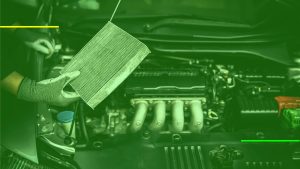How Many Filters Does My Car Have?
Your vehicle has four filters that should be checked for optimal performance and to save you money. The four types of filters are the cabin filter, air filter, oil filter, and fuel filter.
It might seem harmless not to change your filters, but you are costing yourself more money by not changing them as advised.
What Is A Cabin Filter?
The cabin filter (located inside the cabin/vehicle) cleans/filters out pollen, dust, and other particles that come into your car via your heating and air conditioning.
3 Reasons To Change Your Cabin Filter

- Clean Air
Changing your filter regularly helps reduce pollens, dust, and other particles from entering the cabin. You will also notice that your vehicle will smell better and not have a musty smell coming from the vents. - Prevents Visibility Issues
When the filter is dirty it can’t intake air properly. When this happens you may notice that your vehicle does not defog your windows properly. - Lengthens The Life Of Your A/C Heating System
When you have a clean filter your vehicle’s A/C Heating unit doesn’t have to work as hard to intake air. This saves wear and tear on the motor, extending its life.
Contact us or call us today to schedule an appointment 484-369-8342
What Is A Car Air Filter?
- Your Car’s Air Filter is located near the engine. As your car’s engine runs it is pulling air in to cool and provide proper air-to-fuel mixture for optimal performance. The vehicle air filter blocks debris such as dust, insects, and other particles your car encounters. Having a clean air filter keeps the debris from reaching the engine, which allows the engine to run smoothly.
3 Reasons To Change Your Vehicle's Air Filter
- Optimal Vehicle Performance:
Getting the proper airflow to the engine provides more power to the engine. - Saves fuel:
With the correct oxygen ratio received by the engine, the fuel can combust properly, which uses less gas. - Clean Exhaust:
When less air enters the engine, the fuel combustion that occurs will emit a darker black smoke. This is not good for your engine’s health or performance.
What Is An Oil Filter?
Your engine needs a continuous and healthy flow of clean oil to operate properly. As the engine uses the oil it is put under intense heat and can carry engine debris from the process. The debris can be metal particles, dirt, and oxidized oil. As the oil prepares to go through the engine cycle again, it passes through the oil filter to rid itself of the debris.
Imagine using cooking oil over and over again… That is how your engine feels when it goes without an oil and filter change regularly.
3 Reasons To Change Your Vehicle's Oil Filter
- Reduce Engine Wear & Increase Performance:
An unclean filter will restrict the oil flow your engine needs to perform properly. This will decrease performance and cause your engine to work harder, causing damage.
- Better MPG:
An efficient engine provides the most effective gas mileage when traveling. To do that, it is essential to keep your engine clean and devoid of particles. As engines run smoothly with fresh oil, their performance changes and so does the capability to use fuel a lot more efficiently. This means, expectedly, better gas mileage and major cost savings.
- Worry-Free Emissions Testing:
A smooth-running engine means effective performance and far better mileage. Plus, it helps you quickly pass the vehicle emissions test with no issues. Simply by doing regular oil changes, your car will run efficiently with much better mileage.
What Is A Fuel Filter?
The gas you put in your car is not 100% clean from impurities like dust and other particles. The fuel filter removes those particles from entering the engine and allows the fuel injectors to operate properly. Clean fuel prevents damage to your engine and improves performance.
2 Reasons To Change Your Fuel Filter
- Optimal Engine Performance:
A dirty fuel filter restricts the amount of fuel that enters the engine, causing poor performance, like lack of acceleration and possible stalling. Your fuel pump will also be working harder to pull the amount of fuel needed. - Protect Expensive Parts:
A dirty fuel filter lets contaminants into the engine that are abrasive and cause damage over time. With that and the extra strain on your fuel pump, you could be looking at replacing very expensive parts.